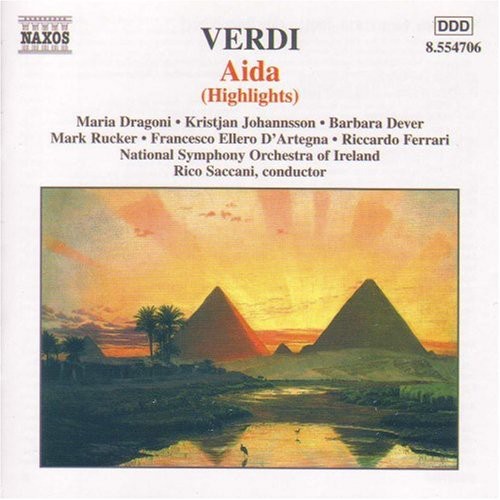Show results for
Deals
- 4K Ultra HD Sale
- Action Sale
- Alternative Rock Sale
- Anime sale
- Award Winners Sale
- Bear Family Sale
- Blu ray Sale
- Blues on Sale
- British Sale
- Classical Music Sale
- Comedy Music Sale
- Comedy Sale
- Country Sale
- Criterion Sale
- Electronic Music sale
- Fantasy Film and TV
- Folk Music Sale
- Hard Rock and Metal Sale
- Horror Sci fi Sale
- Jazz Sale
- Kids and Family Music sale
- Kids and Family Sale
- Metal Sale
- Music Video Sale
- Musicals on Sale
- Mystery Sale
- Naxos Label Sale
- Olive Films on Sale
- Page to Screen Sale
- Paramount Sale
- Pop and Power Pop
- Rap and Hip Hop Sale
- Reggae Sale
- Rock and Pop Sale
- Rock Legends
- Soul Music Sale
- TV Sale
- TV Sale
- Vinyl on Sale
- War Films and Westerns on Sale

Aida
- (Highlights)
- Format: CD
- Release Date: 1/16/2001

Aida
- (Highlights)
- Format: CD
- Release Date: 1/16/2001
- Conductors: Rico Saccani
- Orchestras: National Symphony Orchestra of Ireland
- Performers: Barbara Dever, Francesco Ellero d'Artegna, Kristjan Johannsson, Maria Dragoni, Mark Rucker, Riccardo Ferrari
- Label: Naxos
- UPC: 636943470626
- Item #: NAX347062
- Genre: Classical
- Release Date: 1/16/2001

Product Notes
Verdi wrote his Egyptian opera Aida in response to a commission from the Khedive of Egypt for the opening of the new Cairo Opera House, after rejecting requests for an anthem to celebrate the opening of the Suez Canal a year earlier. The first performance was conducted by the famous double-bass player Bottesini. Spectacle, of which some stage directors have made much, is provided particularly in the return of the victorious Radames in triumph. The story was the invention of the French egyptologist Auguste Mariette, elaborated in French prose by Camille Du Locle, before the final Italian text was drafted. Aida remains a popular part of Italian opera repertoire. Familiar concert excerpts from Aida inevitably include the tenor Celeste Aida (Heavenly Aida) and Aida's Ritorna vincitor (Return victorious). The grand march has celebrated many an unoperatic festivity and has allowed spectacular extravagance in more ostentatious productions of the opera. O patria mia (O my homeland) for Aida in the third act adds a particular poignancy, while the final death scene of Radames and Aida is also sometimes to be heard in dramatic isolation.

